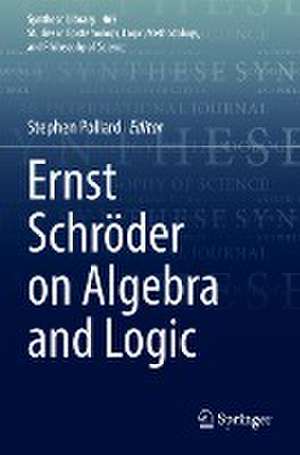Ernst Schröder on Algebra and Logic: Synthese Library, cartea 465
Editat de Stephen Pollarden Limba Engleză Paperback – 28 iul 2023
The works translated record Schröder’s journey out of algebra into algebraic logic and document his transformation of George Boole’s opaque and unwieldy logical calculus into what we now recognize as Boolean algebra. Readers interested in algebraic logic and abstract algebra can look forward to a tour of the early history of those fields with a guide who was exceptionally thorough, unfailingly honest, and deeply reflective.
| Toate formatele și edițiile | Preț | Express |
|---|---|---|
| Paperback (1) | 893.21 lei 6-8 săpt. | |
| Springer International Publishing – 28 iul 2023 | 893.21 lei 6-8 săpt. | |
| Hardback (1) | 899.21 lei 6-8 săpt. | |
| Springer International Publishing – 28 iul 2022 | 899.21 lei 6-8 săpt. |
Din seria Synthese Library
- 15%
 Preț: 638.43 lei
Preț: 638.43 lei - 18%
 Preț: 989.98 lei
Preț: 989.98 lei - 15%
 Preț: 596.69 lei
Preț: 596.69 lei - 18%
 Preț: 903.93 lei
Preț: 903.93 lei - 15%
 Preț: 586.88 lei
Preț: 586.88 lei - 15%
 Preț: 696.50 lei
Preț: 696.50 lei - 18%
 Preț: 892.90 lei
Preț: 892.90 lei - 15%
 Preț: 643.34 lei
Preț: 643.34 lei -
 Preț: 282.33 lei
Preț: 282.33 lei - 5%
 Preț: 372.19 lei
Preț: 372.19 lei -
 Preț: 443.10 lei
Preț: 443.10 lei - 15%
 Preț: 637.59 lei
Preț: 637.59 lei - 18%
 Preț: 958.88 lei
Preț: 958.88 lei - 15%
 Preț: 642.36 lei
Preț: 642.36 lei - 18%
 Preț: 1230.66 lei
Preț: 1230.66 lei - 15%
 Preț: 642.83 lei
Preț: 642.83 lei - 18%
 Preț: 1000.39 lei
Preț: 1000.39 lei -
 Preț: 389.70 lei
Preț: 389.70 lei - 15%
 Preț: 637.28 lei
Preț: 637.28 lei - 18%
 Preț: 952.26 lei
Preț: 952.26 lei - 18%
 Preț: 1231.32 lei
Preț: 1231.32 lei - 15%
 Preț: 645.96 lei
Preț: 645.96 lei -
 Preț: 395.85 lei
Preț: 395.85 lei -
 Preț: 400.47 lei
Preț: 400.47 lei - 18%
 Preț: 1225.48 lei
Preț: 1225.48 lei - 15%
 Preț: 638.89 lei
Preț: 638.89 lei - 18%
 Preț: 1232.09 lei
Preț: 1232.09 lei -
 Preț: 380.45 lei
Preț: 380.45 lei -
 Preț: 394.87 lei
Preț: 394.87 lei - 15%
 Preț: 640.37 lei
Preț: 640.37 lei - 15%
 Preț: 639.08 lei
Preț: 639.08 lei -
 Preț: 381.98 lei
Preț: 381.98 lei - 15%
 Preț: 643.00 lei
Preț: 643.00 lei - 15%
 Preț: 672.29 lei
Preț: 672.29 lei
Preț: 893.21 lei
Preț vechi: 1089.29 lei
-18% Nou
Puncte Express: 1340
Preț estimativ în valută:
170.96€ • 177.81$ • 143.26£
170.96€ • 177.81$ • 143.26£
Carte tipărită la comandă
Livrare economică 14-28 martie
Preluare comenzi: 021 569.72.76
Specificații
ISBN-13: 9783031056734
ISBN-10: 3031056736
Pagini: 342
Ilustrații: XVII, 342 p. 1 illus.
Dimensiuni: 155 x 235 mm
Greutate: 0.51 kg
Ediția:1st ed. 2022
Editura: Springer International Publishing
Colecția Springer
Seria Synthese Library
Locul publicării:Cham, Switzerland
ISBN-10: 3031056736
Pagini: 342
Ilustrații: XVII, 342 p. 1 illus.
Dimensiuni: 155 x 235 mm
Greutate: 0.51 kg
Ediția:1st ed. 2022
Editura: Springer International Publishing
Colecția Springer
Seria Synthese Library
Locul publicării:Cham, Switzerland
Cuprins
Preface.- 1) Introduction.- 2) Ernst Schröder's "Lehrbuch der Arithmetik und Algebra für Lehrer und Studirende" (1873).- 3) Ernst Schröder's booklet "Der Operationskreis des Logikkalkuls (1877).- 4) Ernst Schröder “Note über den Operationskreis des Logikcalculs” (1877).- Bibliography.- Name/Subject Index
Notă biografică
Stephen Pollard has been on the faculty of Truman State University since 1985. He received his B.A. from Haverford College in 1979 and his Ph.D. from the University of Texas in 1983. His research and publications deal primarily with logic and the philosophy of mathematics, but his interests also include classical Greek philosophy, American pragmatism, and the philosophy of science. Pollard is the author of Philosophical Introduction to Set Theory (Notre Dame, 1990), co-translator of The Continuum by Herman Weyl (Dover, 1994), co-author of Closure Spaces and Logic (Kluwer, 1996), translator/editor of Essays on the Foundations of Mathematics by Moritz Pasch (Springer, 2010), and author of A Mathematical Prelude to the Philosophy of Mathematics (Springer, 2014). His papers have appeared in Analysis, Erkenntnis, Logique et Analyse, The Monist, Notre Dame Journal of Formal Logic, Noûs, Philosophical Studies, Philosophia Mathematica, Synthese and other journals
Textul de pe ultima copertă
This volume offers English translations of three early works by Ernst Schröder (1841-1902), a mathematician and logician whose philosophical ruminations and pathbreaking contributions to algebraic logic attracted the admiration and ire of figures such as Dedekind, Frege, Husserl, and C. S. Peirce. Today he still engages the sympathetic interest of logicians and philosophers.
The works translated record Schröder’s journey out of algebra into algebraic logic and document his transformation of George Boole’s opaque and unwieldy logical calculus into what we now recognize as Boolean algebra. Readers interested in algebraic logic and abstract algebra can look forward to a tour of the early history of those fields with a guide who was exceptionally thorough, unfailingly honest, and deeply reflective.
The works translated record Schröder’s journey out of algebra into algebraic logic and document his transformation of George Boole’s opaque and unwieldy logical calculus into what we now recognize as Boolean algebra. Readers interested in algebraic logic and abstract algebra can look forward to a tour of the early history of those fields with a guide who was exceptionally thorough, unfailingly honest, and deeply reflective.
Caracteristici
Gives English readers access to key texts in the early history of algebraic logic. Deepens our understanding of the intellectual milieu of figures such as Dedekind, Frege, Husserl, and C. S. Peirce Helps us see how Ernst Schröder’s innovations in logic were a natural extension of his work in abstract algebra
